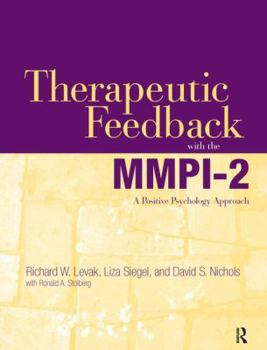Therapeutic Feedback with the Mmpi-2: A Positive Psychology Approach
Select Format
Select Condition 
Based on Your Recent Browsing
Book Overview
Therapeutic Feedback with the MMPI-2 provides the clinician with empirically-based, practical information about how to convey the abundance of information in the MMPI-2 profile in a way that is collaborative, empathic, hopeful, and facilitates a therapeutic alliance. Readers will find this book to be as useful and applicable as the MMPI-2 itself, which is used in psychiatric hospitals; correctional settings; in evaluations for job selection, general medicine, forensic and child custody cases; and even in screenings for television, game, and reality shows. The authors expand upon this already robust test by demonstrating how therapeutic assessment and feedback can be improved upon by considering three contributions from positive psychology:
that behavior can be viewed as potentially adaptive; traditional pathological and maladaptive behaviors can be reframed as understandable responses to stressors that therapeutic feedback is empathic, nonjudgmental, and mostly jargon free; humans respond to overwhelming stress in understandable ways that the therapist can give coherence and meaning to lastly, that therapeutic feedback stresses self-esteem and resilience building through self-awareness as a goal.Discussion centers around ten scales and 27 common code types. Each section addresses the complaints, thoughts, emotions, traits and behaviors associated with the profile; therapists' notes; lifestyle and family background; modifying scales; therapy and therapeutic pitfalls; feedback statements; and treatment and self-help suggestions. The larger page size reflects the size of the MMPI-2 interpretive reports and makes it easy for clinicians to copy pages of the book to share with their clients. Therapeutic Feedback with the MMPI-2 is the most detailed volume available on MMPI-2 feedback and is a valuable addition to the bookshelf of any clinician who uses this test.




















